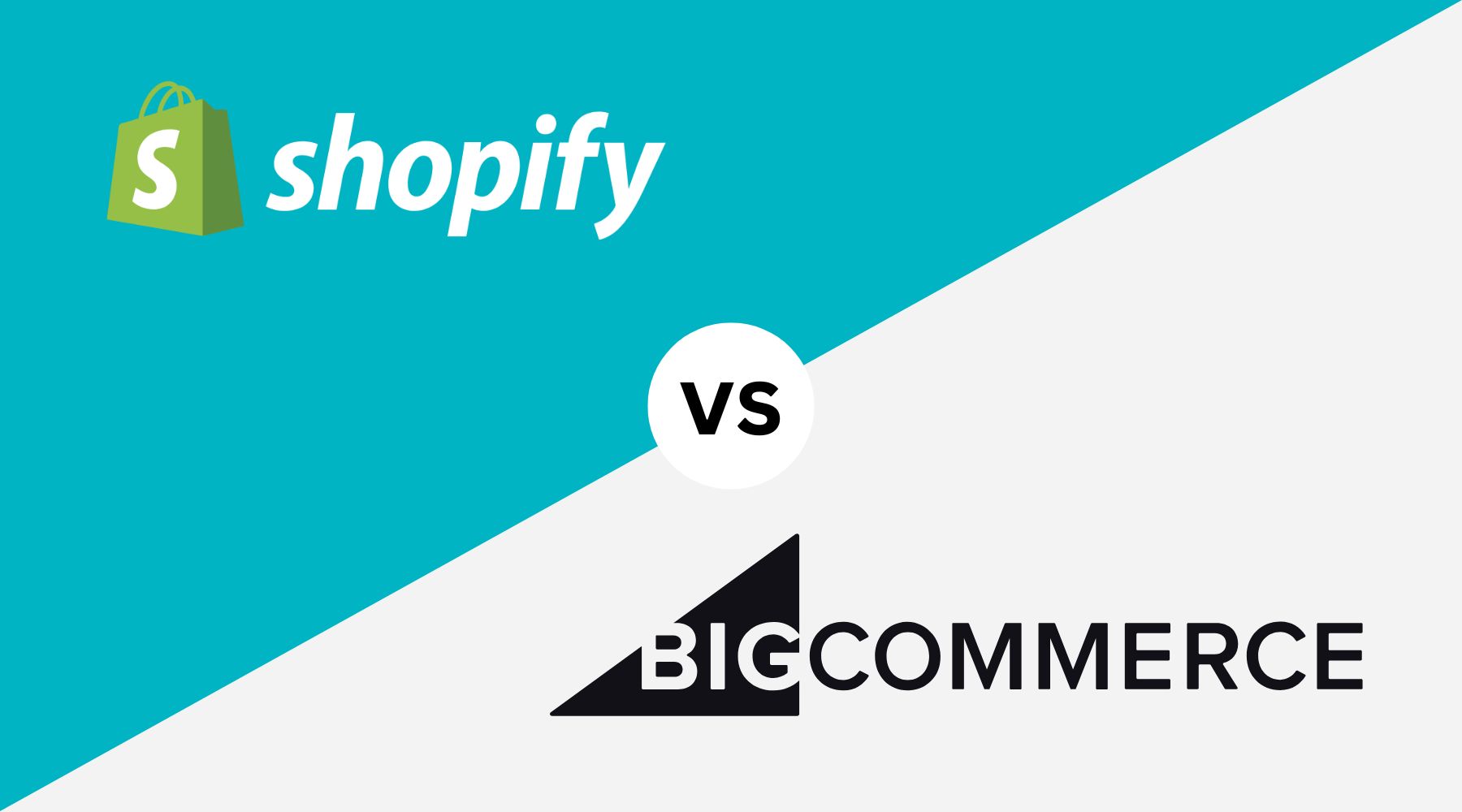If you want to build a store that launches quickly and can scale long term, BigCommerce and Shopify are two of the most compelling SaaS platforms on the market.
Both rely on a fully hosted system that removes technical hurdles for you:
- hosting,
- security,
- updates, and
- maintenance
are all included. You get a performant setup that works right out of the box.
Shopify follows a highly structured, modular approach. You can start immediately, adjust your design via drag-and-drop, and add products with just a few clicks. BigCommerce is similarly user-friendly but gives you more flexibility when it comes to features that go beyond standard functionality.
That’s especially useful for B2B setups or more complex pricing structures.
Both platforms target similar audiences: growing brands that don’t want to maintain on-premise software and value a fast time-to-market. This makes them particularly attractive for DTC brands and hybrid omnichannel retailers. With a central dashboard and a wide range of integrations, both systems give you a solid foundation to scale while keeping training needs low.
Compared to traditional e-commerce shop systems like Shopware, where you’re responsible for hosting and system maintenance, BigCommerce and Shopify offer a much leaner setup.
You can focus on your business, while the system scales automatically in the background. The real differences lie in the details, and that’s exactly what the next sections will cover.
BigCommerce vs Shopify: Our 9 Tips
If you're choosing between BigCommerce and Shopify, you're not just comparing technical specs.
You're deciding based on:
- everyday usability,
- growth potential,
- marketing power, and
- support.
To save you hours of research, here are 9 concise but well-grounded tips.
9 Tips for Choosing the Right Platform for Your Business
When deciding between BigCommerce and Shopify, it’s not a gut decision. It’s about which platform aligns better with your goals, your team, and your technical structure. These 9 tips highlight the most important differences, practical, clear, and focused on what truly drives e-commerce success.
1. Usability & Setup: How quickly can you get started?
The first steps with a shop system often determine how the entire project will unfold. This is where you quickly see which platform offers MVP-friendly onboarding and which one leans more toward tech-driven teams.
|
Criteria |
Shopify |
BigCommerce |
|
Setup time |
Ready to go in just a few hours |
Somewhat more technology-intensive, takes longer |
|
user interface |
Intuitive, visual, no code required |
More technical, more complex menus |
|
Theme Editor |
Drag-and-drop, live editing |
Less visual, partly code-based |
|
Training effort |
Low |
Medium to high |
Shopify is ideal for teams that want to get started without a large development budget. BigCommerce gives you a solid foundation as well, but typically requires more technical understanding. This becomes especially clear in the theme editor: Shopify significantly lowers the barrier to entry.

2. Functions & Extensibility
If you don’t just want to launch your online store but scale it long term, the right features and how easily they can be expanded, become essential. Both platforms offer a solid foundation, but the level of depth you can achieve varies significantly.
Comparison of native features:
|
function |
Shopify |
BigCommerce |
|
Discount codes & vouchers |
Integrated |
Integrated |
|
Product variants |
Up to 100 with 3 options |
Up to 600 variants |
|
Customer groups |
About Apps |
Natively available |
|
SEO tools |
Basic functions natively, rest via apps |
Extensively natively integrated |
|
Multi-currency |
With Shopify Markets |
Immediately available |
BigCommerce advantages:
- Advanced permission management for larger teams
- Native B2B features: tiered pricing, custom price lists, customer groups
- Built-in product filtering, custom fields, and faceted navigation
- API-first approach for integrations with ERP, CRM, or PIM systems
Shopify advantages:
- More than 8,000 extensions in the App Store
- Seamless integrations with tools like Klaviyo, Google Ads, or Meta
- Native cart-abandonment automations
- Extensible checkout logic (starting with Shopify Plus)
- A massive partner ecosystem for custom solutions
If you’re looking for a system that offers many business features out of the box, BigCommerce is a strong choice, its power lies in its built-in functionality. But if you want the flexibility to test, rely on proven apps, and scale modularly, Shopify gives you significantly more room to grow.
3. Design & Customization – how flexible are layout and CI?
You don’t want to look like everyone else. Your store needs to reflect your brand and adapt cleanly to your visual identity. It’s not just about the homepage, the product pages, checkout, and mobile experience matter just as much.
Shopify:
- Themes selectable and editable directly in the backend
- Color schemes, typography, and grid layouts adjustable with a few clicks
- Large selection of free and paid themes in the official store
- Access to Liquid code for advanced customization
- Headless options available via Shopify Hydrogen and the Storefront API
BigCommerce:
- Stencil theme engine provides more technical flexibility for developers
- Design API enables deep customization of templates, widgets, and CSS
- Frontend can be fully individualized using custom components
- No full visual editor, most adjustments require coding
If you're a designer or marketer and want the freedom to implement changes quickly without relying on developers, Shopify is your playground. If you have a development team and want deeper control over the frontend architecture, BigCommerce gives you significantly more room to maneuver.

4. Multichannel & POS – how well does omni-channel sales work?
Multichannel isn’t a buzzword, it’s a revenue engine. Customers move fluidly between social media, marketplaces, Google Shopping, and in-store experiences. What really matters is how seamlessly your platform connects these channels and how much additional effort it takes to keep everything in sync.
|
channel |
Shopify POS & Multichannel |
BigCommerce with third-party providers |
|
Social Commerce |
Native linking with Meta, TikTok, Pinterest |
Plugin or API based |
|
Marketplaces |
Amazon, eBay etc. can be directly linked |
Additional tools required (e.g. CedCommerce) |
|
On-site cash register solution |
Shopify POS app with central backend |
Integration via third-party providers such as Square |
|
Data synchronization |
Real-time sync of all channels centrally |
Partly manually or via middleware |
Shopify gives you a mature ecosystem with an integrated POS app and stable native connections. Inventory stays synced across all channels, and you don’t need extra tools to sell on social platforms. BigCommerce offers similar possibilities, but often through third-party providers, which means extra costs, additional maintenance, and potenzielle Bruchstellen in deinem Setup.
5. Scalability – how well do the platforms grow with you?
Once your store gains momentum, you need a platform that can keep up, not only in terms of traffic, but also in functional depth, system architecture, and international expansion.
|
Scaling factor |
Shopify Plus |
BigCommerce Enterprise |
|
Hosting & Infrastructure |
Inclusive, auto-scaling |
External, flexible choice |
|
API capability |
Headless-ready, modern interfaces |
Highly customizable, even for complex use cases |
|
Multistore option |
Possible via workarounds and partner solutions |
Available ex works |
|
Use Case Focus |
D2C, B2C, rapid growth |
B2B, complex business processes |
Shopify Plus works like a scalable commerce framework that is built for high performance out of the box, including CDN, auto-scaling hosting, and hands-off maintenance. This makes it ideal for brands that want to grow with a clear roadmap and without technical overhead. Especially in the D2C space, where time-to-market is critical, Shopify delivers results fast.
BigCommerce Enterprise, on the other hand, shines when you need deeper control over business logic. Custom modules, advanced server configurations and multi-layered architecture give you the flexibility required for large B2B setups or highly customized commerce workflows.
You’ll find more detailed insights and recommendations in our full comparison: Shopify Plus vs BigCommerce Enterprise.
6. Internationalization: Which platform offers more global power?
Global e-commerce is already the norm. But running international storefronts requires much more than a translated homepage. You need region-specific payment options, legal compliance, tax handling, localized content, and scalable shipping logic for every target market.
|
function |
Shopify (Markets) |
BigCommerce |
|
Domains & Languages |
Manageable directly in the backend |
Via app or individual solution |
|
Currency switching |
Automatic, with local pricing logic |
Possible via third-party providers |
|
Local payment methods |
Native integration (e.g. Klarna, Sofort, iDEAL) |
Mostly via APIs or plugins |
|
Tax calculation |
Automated according to market specifications |
Partially manual configuration |
|
Checkout customization |
Country-specific with Shopify Plus |
Only via additional developments |
Shopify Markets makes internationalization incredibly easy to manage:
You control domains, currencies, languages and pricing from one central interface. You also get access to a wide range of local payment methods that can be activated without additional tools. The entire checkout can be adapted to regional requirements, a major advantage if you want global growth without relying on constant agency support.
BigCommerce also offers internationalization features, but in a more modular way. Key functions like multi-language or multi-currency support often require third-party apps or extra configuration. This gives you more flexibility, but it also increases your maintenance workload and technical overhead.
If you want to enter new markets with minimal complexity, Shopify gives you a complete, ready-to-use toolkit. BigCommerce offers more creative freedom but with more responsibility.

7. Performance & Security
Your store can look stunning, but if it loads slowly or isn’t available, your audience will bounce. Load speed doesn’t just affect the user experience; it also impacts your Google rankings and your conversion rate.
|
factor |
Shopify |
BigCommerce |
|
Hosting |
Own hosting with integrated scaling |
Hosting via partner or self-managed |
|
CDN |
Globally integrated (Cloudflare) |
Optional, depending on your hosting setup |
|
SSL certificate |
Standard, automatically activated |
Optional, partly to be integrated manually |
|
Updates |
Automatically and regularly |
Manually or depending on the setup |
|
Uptime |
Maximum stability through SaaS infrastructure |
Variable, depending on infrastructure |
Shopify provides a fully managed, stable system that runs without additional effort. Hosting, CDN, SSL, and updates are all included. This reduces technical dependencies and saves you countless support hours. Especially for international stores or large-scale campaigns, you can rely on fast load times and consistent uptime.
BigCommerce gives you more control, but it also puts you in charge of hosting and performance. This can lead to great results if you’re working with a strong development team but it also increases the need for monitoring, debugging, and security management.
If you don’t want to deal with caching, server load, or DNS management on a daily basis, Shopify offers the far more stress-free experience.
8. Costs & Price Structure
When choosing your platform, the entry price matters far less than the long-term calculation. This includes monthly fees, variable charges, and the cost of extensions. Your TCO (Total Cost of Ownership) determines whether the platform is truly compatible with your business model.
|
Cost factor |
Shopify |
BigCommerce |
|
Basic fees |
From $39 (Basic), up to approximately $2,300+ (Plus) |
Sales-dependent levels starting at approximately $29 |
|
Transaction fees |
Yes, with external gateways (e.g. PayPal) |
None, even with third-party gateways |
|
Extensions |
Partly paid in the App Store |
Many features included natively |
|
Enterprise pricing |
Transparent and predictable |
On request, depending on sales and setup |
Shopify provides a clearly structured pricing model. You know upfront what to expect, making it easy to budget for future scaling. Add-on apps come with extra costs, but you can book them flexibly and cancel them at any time.
BigCommerce uses a revenue-based pricing structure. During strong growth phases, this can be more cost-efficient because there are no transaction fees. However, it requires tight financial control especially in the Enterprise segment, where custom contracts and negotiated rates are common.
If predictability and modular scalability matter to you, Shopify is easier to calculate. If you're already generating high revenue and want to avoid fees, BigCommerce may offer the more favorable cost structure.
Read more here: Shopify Advanced vs Shopify Plus to learn when an upgrade becomes worthwhile.
9. Support, Community & Partner Network
Even the best platform is useless if you’re left on your own when something goes wrong. That’s why it’s crucial to know how well you’ll be supported, both by official customer service and through the wider ecosystem of community resources and external partners.
|
Area |
Shopify |
BigCommerce |
|
Support |
24/7 via chat, email, sometimes telephone |
Business Hours, Ticket System |
|
Community |
Very active, worldwide, many German-speaking forums |
Smaller, primarily focused on the US market |
|
Agency network |
Large, highly specialized (e.g. CRO, migration) |
Small, little focus on the DACH region |
|
documentation |
Comprehensive, regularly updated |
Solid, but technically complex |
Shopify stands out with a globally structured support system that’s available around the clock. On top of that, you’ll find a large number of agencies specializing in conversion optimization, setup, migration, and custom development. The partner ecosystem is especially strong in German-speaking markets.
BigCommerce offers solid documentation and reliable support, though often limited to U.S. business hours. Its partner network is smaller, particularly in the DACH region and relies more heavily on in-house expertise.
If you value fast response times, local expertise, and a strong network of agency partners, Shopify gives you a significantly better long-term support backbone.
If you’re looking for hands-on assistance, you can find the right support through our Shopify Plus agency.

Shopify vs BigCommerce - Our Conclusion
In the end, the decision between Shopify and BigCommerce depends heavily on the goals you’re pursuing with your online store. If you want to launch quickly without diving deep into technical details, there’s a lot that speaks in favor of Shopify.
You get a reliable ecosystem, a strong partner network, and an interface that works even without developer expertise. For D2C brands, startups, and agile marketing teams, that’s a clear advantage.
BigCommerce, on the other hand, shows its strengths when your requirements are more complex for example in B2B environments, tiered pricing, or multi-store structures. If you prefer working directly with the code or want to maintain full control over your infrastructure, BigCommerce is the more robust platform. However, this also means you need a tech-savvy team.
Here’s the direct comparison again in a clear, easy-to-skim table:
|
Area |
Shopify |
BigCommerce |
|
Introduction |
Fast, without developers |
More technology-intensive, more setup |
|
Extensibility |
App-based, modular |
Many functions natively |
|
design |
Visual customization, Liquid |
Developer-friendly, APIs |
|
Multichannel |
Strong, natively integrated |
Third-party provider required |
|
Scaling |
Automatic, SaaS |
Manually, depending on configuration |
|
internationalization |
Integrated with Shopify Markets |
Expandable with additional tools |
|
Performance & Security |
Hosting included, updates automatically |
Hosting yourself, security plugins required |
|
Cost structure |
Clearly calculable, TCO transparent |
Variable, worthwhile with high turnover |
|
Support & Community |
Strong worldwide |
Expandable in the DACH region |
You can find out more about this topic in the comparison WooCommerce vs Shopify.
Bonus: Additional Platform Comparisons & Alternatives
If you’re still unsure whether Shopify or BigCommerce is the right system for your business, it’s worth taking a look at additional platform comparisons. Especially in the mid-funnel phase when you’re weighing multiple options against each other, it’s important to understand all relevant systems, including their strengths, weaknesses, and typical use cases.
If you want maximum flexibility and you have a strong development team, take a look at the Magento vs Shopify comparison. This is particularly relevant if you want to self-host and need full access to the codebase.
If pricing structures and licensing models are a key factor for you, Zoey vs Shopify Plus offers valuable insights, especially for growing B2B shops.
If you sell products on creative marketplaces or are building a DIY brand, the Shopify vs Etsy comparison is useful. It highlights how Etsy and Shopify differ when it comes to audience, fees, and scalability.
And if you’re searching for a flexible Shopware alternative, you’ll find a detailed breakdown showing how Shopify performs in a German context compared to the established solution from Jena.
All of these articles help you make the best possible decision for your e-commerce platform.








